
I lived here for three years a quarter century ago. But I have not been back much. A trip to City Lights here or for Chinese
there, when I was living in Los Angeles, but there were not many other trips.
Still, the hills and streets, beaches and bodies of people loom in my
mind. I remember the people I saw
walking the streets of the Tenderloin after work at midnight. I have spent a quarter century thinking about
them. They appeared in my stories and
dreams, books and talks. Friday, I
joined them again, making my way off the BART to the Powell Street Stop off
Market, seeing them there, hanging out, strolling to the Civic Center, past
cable cars. Up I walked from the train,
the smell of pot everywhere. Walking,
they seemed to be everyone, homeless men in wheelchairs, a man in a dress
screaming out at apparently nothing, people on the stroll, still lost in the
city, arriving everday to get away from Trump’s America only to disappear into the
streets here. Homeless people are everywhere
here.
I met Dion at Café Flore on Market Street. He’s been here on and off since 1965. He has a
rent control apartment.
Ron, my old NY buddy, joined us for a drink at Twin Peaks,
looking out at the Castro. With a window
towards the streets, this place has long offered an eye witness view of
history, riots, countless street marches, celebrations and the like,
We drank and chatted for hours.
The next morning, we met Larry in the East Bay and made our way the Muir Woods,
stunning in its beauty. Feels amazing to
be alive on such moments. The stirring
of nature, another consciousness opening up everywhere here. This space offers us another way to live,
another way to think be and exist.
Larry read updates about the fire the night before in
Oakland. People are always looking for
things here, building communities in the most unlikely of places here.
The murals of the mission traced the narratives of a city
coping with waves of displacement. The
stories of evictions and deportations and modes of resistance were everywhere
at the Howard Zinn
Bookfair on Sunday.
So were questions about solidarity and support. I
recalled efforts of those in the New Sanctuary Movement at Judson where we
prevent deportations.
The best session I went to was the ideas for action and
necessary trouble session with Cynthia
Kaufman and Sarah
Jaffe. Jaffe outlined a strategy for
life under Trump. Elements of this this
strategy:
Take care of your own, think survival programs.
Support communities and spaces of resistance.
And play offence.
Remember many recent resistance movements have grown from red states from
North Carolina to Missouri to North Dakota out of local communities.
These moments offer openings, noted Cynthia
Kaufman. These are times for the
Gramscian optimism of the spirit and pessimism of the will. These are moments
to reconsider what is common sense. It’s a time to reimagine living, contesting
the state, power, and cultural meanings. She suggested organizers engage in
disruptive struggles, in cultural strategies, contesting the state and building
community.
The room was filled with students of organizing talking it
out. Some called for mutual
aid projects to support people in need.
Others outlined more audacious approaches. Many of the ISO organizers called for their
usual recipe of strikes, political analysis and newspaper sales. Others suggested impacted communities to take
the lead. And the hair shirt dour left
seemed to raise its head. We are in a
weird organizing moment. Hopefully, a
little theory and practice can help us through this moment as we play offence. There
has to be joy in our resistance to means of social control.
For our talk on urban spaces as living theater, Larry, Ron
and I shared the floor with a room full of participants eager to continue the conversation. I ran through my session on sustainable
urbanism, highlighting the point that we can reconfigure what cities can be,
even in the midst of a number of clashes, as dialectical intersections opposites,
mutually connected by ever evolving internal relations. Through these
intersections, we reimagine what cities can be, as more and more people in the
world move into cities.
These are spaces to “perform the uncensored image” noted
Larry.
This panel analyzes the use of urban spaces
as a living theater,
linking the practice of radical street performance, poetry, and storytelling
with the transformation of public spaces into storied spaces. The panel is
framed through the research on two books, Bogad’s new book, Tactical Performance: On the Theory and Practice of Serious Play and Benjamin Shepard’s Sustainable Urbanism
and Direct Action: Case Studies in Dialectical Activism. Each project is based on auto-ethnographic research that makes use of the researcher’s feelings, inviting readers into the personal, emotional
subjectivities of the author. The panel considers collisions between contrasting forces as narratives of liberation and revelry intersect with stories of social control, leisure and labor. Case
narratives consider various forms of public space activism, including
semi-clothed bike rides, pranks, and poetry events in public spaces as examples
of play-based movement that works toward opening spaces for alternate uses of
urban space.
Bogad’s
new book, Tactical Performance: On the
Theory and Practice of Serious Play, analyzes and critiques the use of
guerrilla theatre/art for human and civil rights, and for social justice, labor
and environmental campaigns
Shepard’s new book, Sustainable Urbanism and Direct Action: Case Studies in Dialectical Activism, suggests urban activism can manifest in many guises, from community
gardening to mass naked bike rides. But how might we theorize the evidence of
the collisions between social forces that take place in our streets and public
commons? Cities are formed through these collective collisions in time. This
book draws on the author’s own vast experience as an activist to make links
between a theory of practice with rich discussion of the histories of conflicts
over public space. Each chapter examines activist responses to a range of
issues that have confronted New Yorkers, from the struggle for green space and
non-polluting transportation, for housing and the fight for sexual civil liberties.
The cases are shaped through interplay between multiple data sources, including
the author’s own voice as an observing participant, as well as interviews with
other participant activists, historic accounts and theoretical discussion.
Taken together, these highlight a story of urban public space movements and the
ways they shape cities and are shaped by history.
Ron Hayduk will convene this talk, offering commentary. His research
on American politics focus on elections and voting, race and ethnicity, and
immigration and social movements.
linking the practice of radical street performance, poetry, and storytelling
with the transformation of public spaces into storied spaces. The panel is
framed through the research on two books, Bogad’s new book, Tactical Performance: On the Theory and Practice of Serious Play and Benjamin Shepard’s Sustainable Urbanism
and Direct Action: Case Studies in Dialectical Activism. Each project is based on auto-ethnographic research that makes use of the researcher’s feelings, inviting readers into the personal, emotional
subjectivities of the author. The panel considers collisions between contrasting forces as narratives of liberation and revelry intersect with stories of social control, leisure and labor. Case
narratives consider various forms of public space activism, including
semi-clothed bike rides, pranks, and poetry events in public spaces as examples
of play-based movement that works toward opening spaces for alternate uses of
urban space.
Bogad’s
new book, Tactical Performance: On the
Theory and Practice of Serious Play, analyzes and critiques the use of
guerrilla theatre/art for human and civil rights, and for social justice, labor
and environmental campaigns
Shepard’s new book, Sustainable Urbanism and Direct Action: Case Studies in Dialectical Activism, suggests urban activism can manifest in many guises, from community
gardening to mass naked bike rides. But how might we theorize the evidence of
the collisions between social forces that take place in our streets and public
commons? Cities are formed through these collective collisions in time. This
book draws on the author’s own vast experience as an activist to make links
between a theory of practice with rich discussion of the histories of conflicts
over public space. Each chapter examines activist responses to a range of
issues that have confronted New Yorkers, from the struggle for green space and
non-polluting transportation, for housing and the fight for sexual civil liberties.
The cases are shaped through interplay between multiple data sources, including
the author’s own voice as an observing participant, as well as interviews with
other participant activists, historic accounts and theoretical discussion.
Taken together, these highlight a story of urban public space movements and the
ways they shape cities and are shaped by history.
Ron Hayduk will convene this talk, offering commentary. His research
on American politics focus on elections and voting, race and ethnicity, and
immigration and social movements.
Finishing the session, we talked about ways everyone can participate.
“Do you want to live like this forever?” Lynn recalled a
tenant organizer asking her in 1980. She
was holding her new baby but still made it to the organizing meeting the next
day.
Everyone was talking about how to survive this moment. The ISO was recruiting. Organizers were
talking about sanctuary, and sharing resources.
Friends from New York and up and down the cosmopolitan coast
chatted for hours.
Lynn talked about the aids activists back home, wondering if
they have her back. There are times when
solidarity feels tenuous.
But where was the united we wondered. I hope we find it
soon. It’s a great time to be alive. I
Finishing the talk, I wandered back through the Mission to
the Castro, recalling Cleve’s
stories about these changing neighborhoods, their histories and the ways
people such as Dion, Larry, Ron, Lynn, James and I are impacted by them. It was a majestic weekend to be here.
I thought about a new book I had been asked to blurb earlier
in the day. I have long suspected
that modern living is an experiment in loss.
In One Singular Date, Ryan Fletcher confirms and expands the point, highlighting
the ways such an insight offers challenges and openings. “I increasingly feel
that life is a journey of mostly loss and struggle –it’s how we navigate it,
how we treat each other, how we hold each other up, how we support each other
in the face of struggle, and how we work together to combat the forces that
make struggle necessary that truly defines us. If we do our best as a baseline,
then we might find, be open to, and create real joy in this life as well.” In an era, when movements increasingly
struggle with questions about the practice of support, as participants walk
alone, often succumbing to alienation and anomie, Fletcher reminds us to open
our eyes, look out for each other, and be open to the mysteries which take
shape when see each other again as if for the very first time.
Dion and I talked late into the night and I caught an early
flight back to holy Brooklyn.
 |
| Images of a city and its many many friends. |




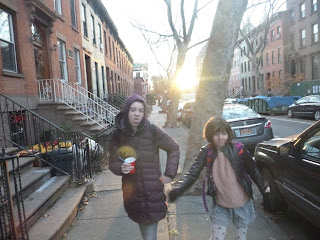











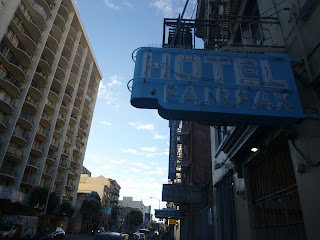































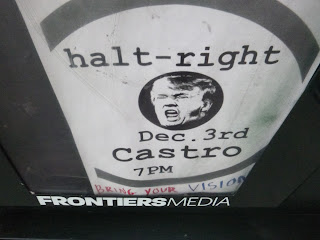








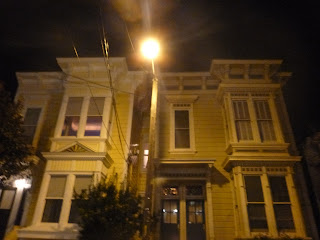

























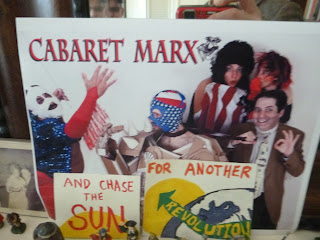





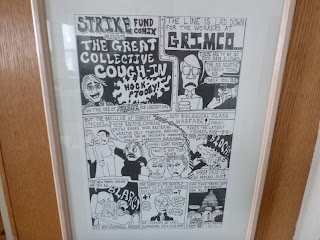






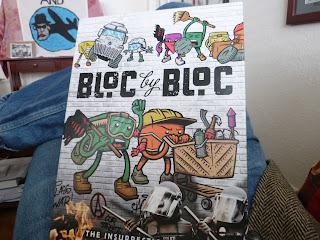






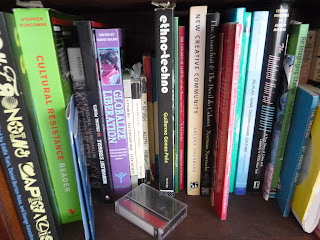



















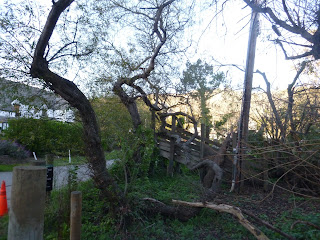









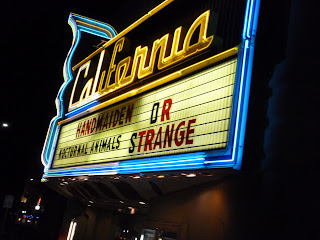









































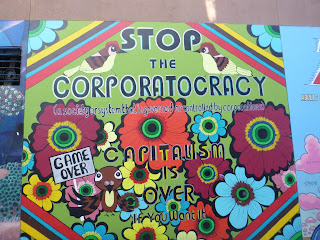














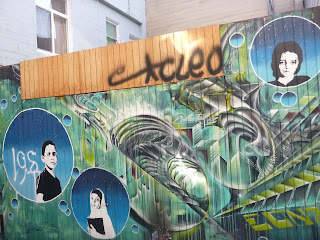





















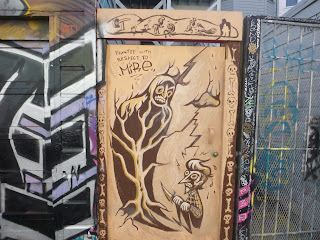
















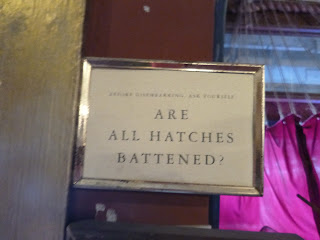






























No comments:
Post a Comment